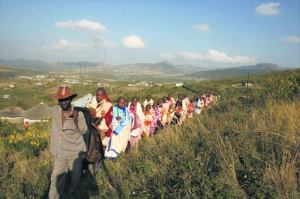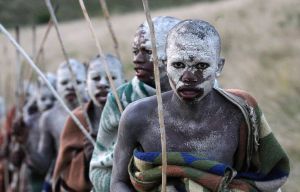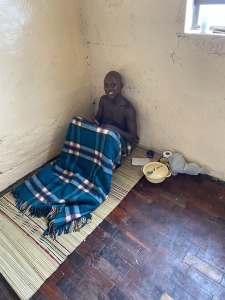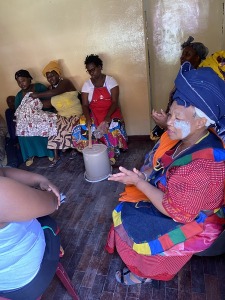Tags
Becoming a Man in Xhosa Culture, Implication of circuncision ritual for a Xhosa Family, Importance of Circumcision in Xhosa Culture, Not a Xhosa man if not circumcised, The importance of Ulwaluko - the circumcision ritual - to Xhosa People, Tradition circumcision - the only circumcision that counts in Xhosa Culture, Traditional Xhosa Circumcision Ritual - Culture - Practice - Dangers, Umgidi - the Xhosa post-circumcision celebration, What it takes to be a Xhosa Man, Xhosa Circumcision Ritual and Post-Ritual
Xhosa Post-Circumcision Party (Umgidi) by an Outsider Looking In
Agnes, our domestic helper of many years, informed us that her adopted son Zolani was to go to the bush to become a man. Zolani, the boy I had seen grow up and had put through high school, had come of age, but would not be a man without undergoing ulwaluko, the Xhosa initiation and circumcision ritual. Zolani completed his schooling last year and was now ready to undergo this rite of passage that would make him a man in Xhosa culture. This ceremony can be quite a financial burden on the typical Xhosa household, and especially on Agnes’s who is a single mother. It involves considerable expense and emotional investment. There is the replacement cost of the initiate’s clothes and other belongings as these must be gotten rid of to symbolise a complete separation from childhood.2 Initiates must have their own room after graduating, which often implies a financial outlay for additional accommodation. Importantly, there is the cost of the umgidi, the celebratory homecoming ceremony for the new initiate, known as an ikrwala, to which dozens of people must be invited. This ceremony cements the standing of the family in the eyes of society. Agnes was clearly proud that her son had reached this transformational life stage. Agnes kept us abreast of Zolani’s progress during his four-week long ulwaluko, as she got up every morning at 4AM to cook food which was taken to the initiation site by appointed men called ncentsa.3 After four weeks of his traditional stay in the bush with fellow initiates, Zolani was ready to return for his umgidi, to which we were privileged to be invited.
Photo – TimesLive
-Photo – The Guardian
What to bring along to the umgidi? Flowers, wine and such mlungu presents are entirely off the mark. Comestibles and celebratory liquor are spot-on, the harder the better. Unimaginative cash in an envelope for the initiate is also not at all frowned upon. The envelope was easy enough, but what in addition? In a flash of inspiration, I pop into Charlie’s Bakery to get a cake. The Jewish woman in charge asks me what the occasion is, and for whom it is.4 Oh, I’d enjoy the Xhosa post-circumcision party, she says, she had been to a few which she loved (it’s probably a Jewish thing…). Now, is Zolani spelt with a ‘Z’ or an ‘X’? They would be writing ‘Congrats Zolani’ in chocolate over the cake as part of its decoration and wanted to make sure. Mind me, in her experience, Xhosa people preferred the fruit cake with icing option rather than their best-selling ‘death-by-chocolate’, so she suggests I take one of those. Do I have any other decoration specifications? What? No. She’s giving me full marks for imagination, but a phallus-shaped theme (ICBM’s, Zeppelins, menhirs etc.) would be entirely wrong, she insists. Thank you.
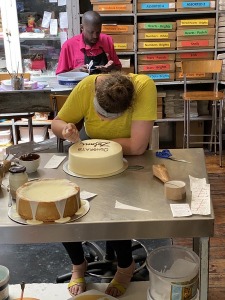
Thirty minutes later we arrive at Agnes’s house in Langa, cake box in hand and envelope in pocket. I have last been here a few years back. Langa is still pure township, there’s not a mlungu in sight. At the front door, we are greeted by women in traditional dress ululating their welcome. Other women are stirring huge pots of food being cooked on gas burners specifically hired for the celebration. The place is abuzz. I hand Agnes the cake and ask to see Zolani. She delivers me to a group of men, Zolani’s minders, who take me to his room. The room is stark and empty. Zolani sits in a corner on a straw mat, naked waist-up with a blanket covering his lower half. He is rather demure and subdued. I think of the pain he endured and shudder, the lapsed Catholic in me knee-bendingly grateful that the Church forbade religious circumcision as far back as 1442.5,6 On the other hand, having some men uncircumcised adds to the cultural diversity of humanity, so I’m proudly adding value in this regard. I congratulate Zolani, hand him his envelope and more importantly, ask him whether he is well and fully recovered. He is over the pain and has survived, for which I’m relieved.7 I greet him and am escorted out of his room by his minders and taken to the courtyard where a group of men are seated on chairs.
There are basically two circles of men, one for the udodana (middle-aged men) and one for the isifana (young men). I’m shown to a seat in the former between two gentlemen, a perfect vantage point for an etic observation of procedures.8 They greet me with the three-phased African handshake. Vuyani speaks very good English and did a documentary on the history of Langa, which he claims was plagiarised. Nicholas is equally engaging. A tin bucket with umqombothi (traditional African beer) is in the middle of the circle. Flies have taken to it. These are waved away by a man who lifts the bucket to his mouth, takes a hefty swig and then passes it around for everyone to drink directly from it in turn. My mouthful has a sour, malty taste. We chat extensively. At some stage, Zolani’s uncle Victor, the master of ceremonies for the day (injoli) announces that the Admonishing Ceremony is about to start and asks us to uncover our heads.
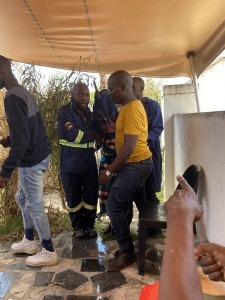
Zolani is brought out by his minders to jubilant polyphonic singing. He is covered from head to toe in a blanket so that no part of him can be seen and carries an unmqayi (black stick), a token of authority which implies that a young man wielding it may start his own family.9,10,11 He is taken behind some makeshift bushes on the side of the courtyard through which he can be partially seen. His khankatha (main minder) removes the blanket off his top half and the two of them sit down. Women remain in the house whereas men are called to address him in turn at this stage. They go up to offer him life advice, which they do from a standing position in a finger-pointing admonishing tone. Everything is in Xhosa, but I get the intention through the vowels, plosives, consonants and especially the three distinctive clicks of the language, catching the odd word like ‘Colgate’ and ‘Palmolive’ in the mix. And then… Uncle Victor asks me to go forward. Me? Speak at this ceremony? (To myself: Me, an uninitiated alien?) Me, Victor? Yes you. The suddenness of the duty catches me off guard. What to tell the young man? A part of my mind flashes the advice my dirty macho uncles gave me in informal, non-ritualised sessions in seedy bars – basically chase any woman you can to the point of exhaustion – but my cautious self says: steady now, circumspection, decorum and gravitas are called for here’.12 I speak to Zolani about respect, personal pride, duty and responsibility under the gaze of the elders, who nod approvingly as I speak. I’m congratulated by the men around me when I retake my seat, who tell me they gave him advice on hygiene, money, sobriety, comportment, courage and family responsibility.
Zolani is then totally covered up again and led out to his room by his minders to more singing. A few more men arrive, one drunk from another party. Vuyani feels he has to apologise for him. It happens everywhere, I say. It happens everywhere, he nods. He then tells me that the traditional surgeon (ingcibi) who performed Zolani’s operation should by now have made an appearance to report to the gathering on Zolani’s comportment in the bush. I told him not to worry, Zolani would have done us proud, our boy was manly and courageous throughout, he would never have let the side down.13
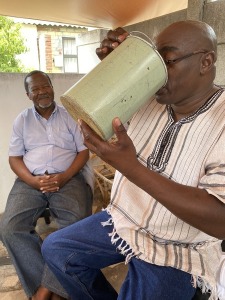
A bottle of ‘Western’ Viceroy brandy then gets opened by a man appointed by Victor, the injoli. He fills the same shot-sized plastic tumbler to the brim with brandy and offers it to the men in the circle in turn. He pours a same-sized tot for every man. If you don’t drink, custom dictates that you nominate someone in the circle to drink the tot on your behalf. Not knowing this, when it comes to my turn, I ask for a quarter of a glass only. He evinces surprise, then pours out a quarter glass for me against the rules, so concessions are made. Another chap comes around with more umqombothi for me to drink. I say I’ve already had some. Show me again! – he urges. I down more communal sour mash.

A little later, Zolani once again emerges from his room with his minders, this time dressed in a brand-new khaki outfit, and blindfolded. It’s the turn of the women to address him. He is seated in a corner of the women’s room. Agnes, the matriarch, makes a peripatetic speech thanking everyone for attending, and says a few words in praise of Zolani. She is the first of a few women to give him advice. Advice over, singing breaks out and Zolani is escorted back to his empty room, where he has to spend the following week on his own, only allowed out for toilet breaks. He is only to emerge a week after his umgidi to take his place in the community.14 Zolani also got a new post-initiation given name of Zanethemba by which he is known in the bush, which means ‘to bring hope’.15 His departure is the signal for the party to begin. Food is served, after which the drinking starts. It was the perfect time to leave, as we were already late for another engagement. I greet the men in my circle with apologies, who protest at my leaving so early. Vuyani admires my hat, saying that his head is balding, and he needs protection.
ooooooooooooooooooo
Notes
- Xhosa for ‘White man at the Xhosa homecoming party for the just-returned circumcision initiate’. Mlungu is a ‘white person’, and’ an umgidi is the celebratory homecoming ceremony for the new initiate after his circumcision retreat.
- Practically all the boy’s belongings must be replaced, including bedding, bicycles, sports equipment, favourite possessions, etc.
- Women are strictly forbidden to go to the initiation site. Ncentsa carry the food for the initiate, and every household must provide for its initiate in the bush.
- The Jewish origins of Charlie’s Bakery in central Cape Town are proudly chalked up on a blackboard outlining its history.
- Initiates are circumcised on the first day of their ulwaluko. Circumcision is performed by a traditional surgeon (ingcibi) who uses a circumcision assegai. It is done without pain killers. Initiates cannot walk for eight days afterwards from the pain and debility.
- The “Cantate Domino” (A.D. 1442), signed by Pope Eugene IV, from the 11th session of the Council of Florence, considers the practice of circumcision a mortal sin, and a danger to the salvation of the soul. See – https://www.catholicdoors.com/faq/qu340.htm.
- There have been, and continue to be, dozens of deaths and amputations each year as a result of botched operations and unsafe practices at ulwaluko For statistics, photographs etc. see the website ulwaluko.co.za. The South African government intervened in the regulation of the practice in 2001, not without resistance, by promulgating the ‘Application of Health Standards in Traditional Circumcision Act’ to protect adolescents undergoing traditional circumcision. A traditional surgeon (ingcibi) must be recommended with a letter of approval from the local traditional leader (usibonda) and is issued with a renewable certificate from the Department of Health, as is the male nurse, the ikhankatha. Safety issues insisted upon include the sterilisation of the circumcision assegai etc. Despite this, unscrupulous operators still abound.Reports of the psychological trauma suffered by young men from failed initiation practices are widespread: The ritual proper is also not without its anxieties. See ‘Peri-rite psychological issues faced by newly initiated traditionally circumcised South African Xhosa men’, Bottoman, Mavundla and Toth, Journal of Men’s Health, Vol. 6, No. 1, pp. 28 35, March 2009. Also, ‘Psychiatric disorder in Xhosa-speaking men following circumcision’, Lauraine Margaret Helen Vivian. Thesis Presented for the Degree of Doctor of Philosophy Department of Psychiatry and Mental Health Faculty of Health Sciences University of Cape Town May 2008, available on Researchgate.
- The terms emic and etic refer to two different anthropological study approaches. The emic perspective strives to understand humans from an insider point-of-view, while the etic takes an objective outsider’s point-of-view.
- The unmqayi is given to initiates as a sign of manhood. It is also taken along to lobola (bride price) negotiations. Going through the traditional ulwaluko ritual is a basic requirement for manhood in a Xhosa-speaking community. After being initiated, a man has the right to get married and start his own family. He also gains the power to participate and address people in the community and traditional gatherings. A sense of ‘communitas’ is a positive consequence of the initiation school. Boys who have been circumcised together form a ‘jural’ union of friendship. Graduates learn certain behaviours and a new vocabulary while they are at the school. It is this knowledge that separates them from non-initiates – From ‘What is Manhood? The significance of Circumcision in the Xhosa Initiation Ritual’. Andile P. Mhlahlo, Stellenbosch University Master’s thesis – 2009, Dept of Sociology and Social Anthropology.
- To be considered a man by the community, the initiate has to undergo circumcision through the traditional ulwaluko ritual. Nothing else counts. Hospitalised circumcisions are heavily stigmatised, and can be spotted by the presence of stitching scars, unlike traditional circumcisions which are not stitched. Furthermore, it is reported that some males engage in status checking behaviour, where a suspected uninitiated male is subjected to questions in the ukuthonta language (a secret language learned in the initiation school), or is forcefully stripped of his clothes to confirm he has been circumcised according to traditional practice. Uninitiated males suffer rejection and lack of respect from peers and women. They are called names, and associations with immaturity and inferiority are rife. Reports of attacks by initiated Xhosa men on suspected uninitiated Xhosa males passing themselves off as ‘men’ are not uncommon. – From ‘How Men become Dogs: Stigmatisation and Marginalisation of Uninitiated Xhosa Males in East London, South Africa’. Thandisizwe Mavundla et. al. Qualitative Health Research 20(7), 931-941, 2010.
- Circumcision status accords Xhosa-speaking males respect, social acceptance and belonging to a collective manhood identity called esidodeni. Ritual circumcision also gives men the right to marry, to inherit property from their parents, and to participate actively in cultural rituals such as the ancestral offering of sacrifices. In contrast, an uninitiated male known as inkwenkwe is generally treated as if he were still a child (irrespective of age). – From ‘Medical male circumcision and Xhosa masculinities: Tradition and transformation’ by Lubabalo Sheperd Mdedetyana. A mini-thesis submitted in partial fulfilment of the requirements for the degree of Magister Artium in Medical Anthropology in the Department of Anthropology and Sociology, University of the Western Cape, November 2018.
- See ‘The Inconsequential Diary No. 82: Dirty Uncles’.
- Zolani’s motto is: Tough times don’t last, tough people do.
- During his week in home confinement, the initiate continues to receive visits from family elders who give him advice. A week later, he is allowed to emerge, but for the next year can only exit the house dressed formally in a blazer, hat and formal shoes. The top button of his shirt must be buttoned no matter the weather. He must also be back home at nightfall to put on the lights in the house. A year after the umgidi, the ikrwala becomes an umfana (young unmarried man) during a short ceremony where his hat and blazer are symbolically removed by his elders. He is now an eligible young man.
- The family and those who knew him before the ceremony can, however, still call him Zolani.
ooooooooooooooooooo

